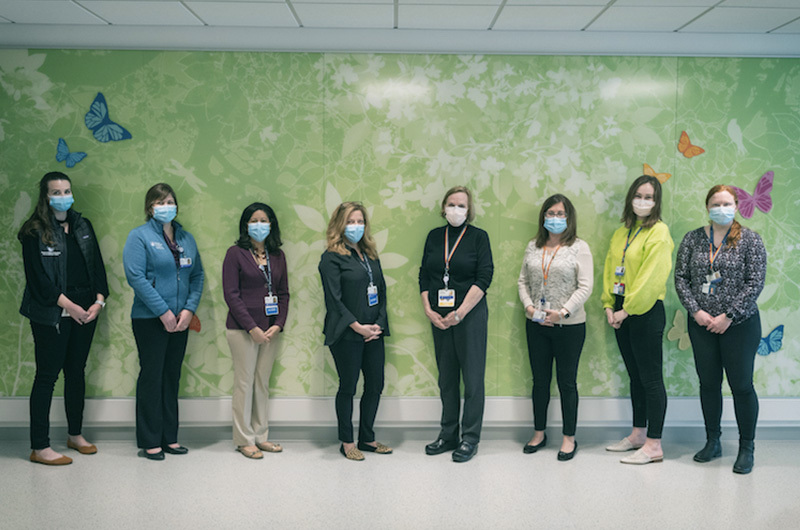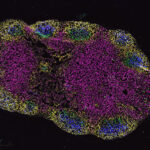Nurses Week 2021: Nurse-led contact tracing team helps reduce the spread of COVID-19

As COVID-19 evolved into a serious threat in March 2020, protecting the health of patients, families, and employees at Boston Children’s Hospital was more important than ever. To stop COVID-19 transmission within the hospital community, registered nurses from across Boston Children’s voluntarily stepped up to form a contact tracing team. Their role: using their clinical and communication expertise to assess exposure risks and notify employees, patients, and families where needed.
“Joining the contact tracing team was a meaningful way for me to help stop the spread of COVID-19,” says Amy Federico, MSN, PNP, an advanced practice registered in the Gene Therapy Program. “In times of crisis, nurses — using their critical thinking and problem-solving skills — can come together to develop strategies and solutions to even the most complex issues, including a pandemic.”
Collaboration and clear communication
As of March 2021, the contact tracing team has traced more than 750 COVID-19-positive employees, the vast majority of whom most likely tested positive due to community exposures. The team also completed tracing for more than 1,600 COVID-19-positive patients, an important safeguard for their family members and other known contacts. Nurses on the team worked closely with Boston Children’s Infection Prevention and Control (IPC) and Occupational Health Services (OHS) to develop a streamlined process for assessing symptoms and communicating possible exposures.
While the team initially had four nurse tracers, it expanded to 11 during the height of the pandemic. “We recruited nurses with very different backgrounds and leveraged those differences to create an operational model to respond to pandemic surges and institutional needs,” says Tyonne Hinson, DrPH, MSN, RN, NE-BC, a contact tracing team member and director of Nursing/Patient Care Operations Diversity Initiatives and the Nursing Career Lattice Program.
A streamlined process
The contact tracing process operates as follows:
- The team receives a notification from IPC or OHS alerting them to a positive patient, parent or guardian, or employee.
- For patients, parents, or guardians with COVID-19, the contact tracer generates a report and reviews the electronic health record to identify anyone who has accessed the patient’s medical record in the identified infectious period. These employees are then notified via e-mail of potential exposure and entered into a database that generates a daily symptom tracker text message.
- For staff with a positive COVID-19 test result, the contact tracer personally calls the employee to communicate the result, conduct a scripted interview, determine symptom history, and guide adherence to personal protective equipment (PPE) guidelines. If there are potential exposures, these individuals are also notified.
The team’s future
According to contact tracing team lead Colleen Dansereau, MSN, RN, CPN, the hope is that the team will be able to disband in the months ahead. “This would mean the pandemic is under control, and there is no need for us,” says Dansereau, director of clinical operations for the Gene Therapy Program and director of Clinical Research Nursing for the Dana-Farber Boston Children’s Cancer and Blood Disorders Center. “As the pace of vaccinations accelerates, the positivity rate in the community has declined, and we have been able to reduce the number of our contact tracers from 11 to five.”
The nurse contact tracers’ support has been invaluable to the institution. “This team has been flexible, accommodating, responsive, and professional during the COVID-19 pandemic to assist IPC in routine tracing efforts to keep our patients, families, and staff safe,” says Jennifer Ormsby, DNP, PNP, CPN, CIC, director of Infection Prevention and Control. “During potential COVID-19 outbreak clusters, this team dropped everything to assist with immediate contact tracing needs.”
Learn more about Boston Children’s response to COVID-19.
Related Posts :
-

Creating the next generation of mRNA vaccines
During the COVID-19 pandemic, mRNA vaccines came to the rescue, developed in record time and saving lives worldwide. Researchers in ...
-

Reversing the trend: Easing the mental health boarding crisis in emergency rooms
Anxiety, depression, and suicide attempts have been rising over the past decade, especially among teens, often landing them in emergency ...
-

Brain wiring predicted adolescents’ emotional health during COVID
The COVID-19 pandemic was emotionally devastating for many adolescents, disrupting their schooling and social/emotional development. Drawing on national data, ...
-

Nurse-led innovations: A virtual-nursing pilot helps nurses thrive
It was night shift on the 9E Inpatient Medical Unit and Marisol Hernandez, BSN, RN, CPN, was helping another nurse ...





